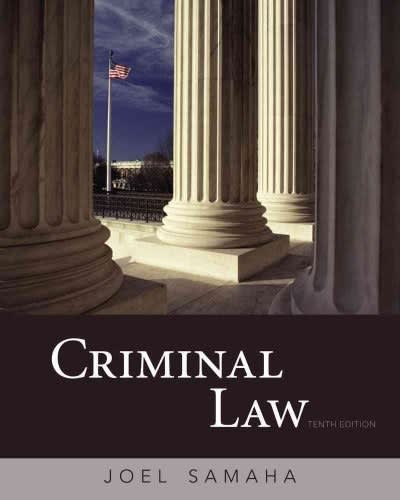Kenneth Rokicki was charged with a hate crime based on the predicate (underlying) offense of disorderly conduct.
Question:
Kenneth Rokicki was charged with a hate crime based on the predicate (underlying) offense of disorderly conduct. Before trial, Rokicki moved to dismiss the charges alleging, among other things, that the hate crime statute was unconstitutional. The trial court denied his motion. Rokicki waived his right to a jury, and the matter proceeded to a bench trial (trial without a jury). Rokicki was convicted, sentenced to two years’ probation, and ordered to perform 100 hours of community service and to attend anger management counseling. He appealed, contending that the hate crime statute is unconstitutionally overly broad and chills expression protected by the First Amendment to the U.S. Constitution. Conviction and sentence affirmed. HUTCHINSON, J. Donald Delaney, store manager of a Pizza Hut in South Elgin, testified that Rokicki entered the restaurant at approximately 1:30 p.m. The victim was a server there and took Rokicki’s order. The victim requested payment, and Rokicki refused to tender payment to him. Donald Delaney, the store manager, who was nearby, stepped in and completed the sale. Rokicki told Delaney not to let “that faggot” touch his food. When Rokicki’s pizza came out of the oven, Delaney was on the telephone, and the victim began to slice the pizza. Delaney saw Rokicki approaching the counter with an irritated expression and hung up the telephone. Before Delaney could intervene, Rokicki leaned over the counter and began yelling at the victim and pounding his fist on the counter. Rokicki directed a series of epithets at the victim including “Mary,” “faggot,” and “Molly Homemaker.” Rokicki continued yelling for ten minutes and, when not pounding his fist, shook his finger at the victim. Delaney asked Rokicki to leave several times and threatened to call the police. However, Delaney did not call the police because he was standing between the victim and Rokicki and feared that Rokicki would physically attack the victim if Delaney moved. Eventually, Delaney returned Rokicki’s money and Rokicki left the establishment.
The victim testified that he was working at the South Elgin Pizza Hut on October 20, 1995. Rokicki entered the restaurant and ordered a pizza. When Rokicki’s pizza came out of the oven, the victim began to slice it. Rokicki then began yelling at the victim and pounding his fist on the counter. Rokicki appeared very angry and seemed very serious. The victim, who is much smaller than Rokicki, testified that he was terrified by Rokicki’s outburst and remained frightened for several days thereafter. Eventually, the manager gave Rokicki a refund and Rokicki left the restaurant. The victim followed Rokicki into the parking lot, recorded the license number of his car, and called the police.
Christopher Merritt, a sergeant with the South Elgin Police Department, testified that, at 2:20 p.m. on October 20, 1995, Rokicki entered the police station and said he wished to report an incident at the Pizza Hut. Rokicki told Merritt that he was upset because a homosexual was working at the restaurant and he wanted someone “normal” to prepare his food. Rokicki stated that he became angry when the victim touched his food. He called the victim a “Mary,” pounded on the counter, and was subsequently kicked out of the restaurant. Merritt asked Rokicki what he meant by a “Mary,” and Rokicki responded that a “Mary” was a homosexual. Merritt conducted only a brief interview of Rokicki because shortly after Rokicki arrived at the police station Merritt was dispatched to the Pizza Hut.
Deborah Hagedorn, an employee at the Pizza Hut in St. Charles, testified that in 1995 Rokicki came into the restaurant and asked for the address of the district manager for Pizza Hut. When asked why he wanted the address, Rokicki complained that he had been arrested at the South Elgin restaurant because he did not want a “f___g faggot” touching his food.
Rokicki testified that he was upset because the victim had placed his fingers in his mouth and had not washed his hands before cutting the pizza. Rokicki admitted calling the victim “Mary” but denied that he intended to suggest the victim was a homosexual. Rokicki stated that he used the term “Mary” because the victim would not stop talking and “it was like arguing with a woman.” Rokicki denied yelling and denied directing other derogatory terms toward the victim. Rokicki admitted giving a statement to Merritt but denied telling him that he pounded his fist on the counter or used homosexual slurs. Rokicki testified that he went to the St. Charles Pizza Hut but that Hagedorn was not present during his conversation with the manager. Rokicki testified that he complained about the victim’s hygiene but did not use any homosexual slurs.
QUESTIONS
1. State the elements of the Illinois Hate Crime Statute.
2. List all of the facts relevant to deciding whether Kenneth Rokicki violated the hate crime statute.
3. According to the Court, why doesn’t the Illinois Hate Crime Statute violate Rokicki’s right to free speech?
4. In your opinion, does the statute punish speech or non expressive conduct?
5. Do you think the purpose of this statute is to prevent disorderly conduct or expression?
6. Does Rokicki have a point when he argues that the statute prohibits only some kinds of hatred—race, ethnic, and sexual orientation—but not other kinds, for example, hatred for animal rights and abortion? Defend your answer.
Step by Step Answer:






